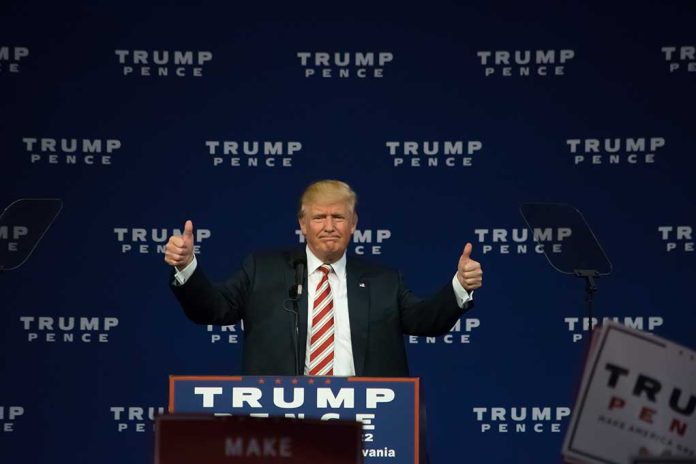
Hamas confirms willingness to relinquish control of Gaza in historic direct talks with the United States, placing their trust in President Trump’s ability to broker peace and end the devastating conflict that has claimed over 53,000 Palestinian lives.
Key Takeaways
- Senior Hamas official Dr. Basem Naim confirmed direct peace negotiations with the United States, expressing the group’s willingness to give up control of Gaza and accept a politically neutral governing body.
- Hamas has proposed a comprehensive peace plan including prisoner exchanges, Israeli troop withdrawal, unrestricted humanitarian aid access, and Gaza reconstruction without forced displacement.
- The group specifically cited President Trump as being capable of pressuring Israel to end the war, demonstrating confidence in his diplomatic abilities despite ongoing White House skepticism.
- Over 53,000 Palestinians have died in the conflict, including 15,000 children, while more than 50 Israeli hostages remain in Hamas custody.
- The U.S. officially designates Hamas as a terrorist organization, making these direct talks a significant diplomatic development in the ongoing Middle East crisis.
Historic Direct Negotiations Confirmed
In a stunning development that could reshape Middle Eastern politics, senior Hamas official Dr. Basem Naim has confirmed that direct peace negotiations are underway between the Palestinian group and the United States government. This marks an extraordinary diplomatic shift considering Hamas remains officially designated as a terrorist organization by both the U.S. and UK governments. The talks represent the most significant diplomatic engagement with Hamas in years and signal a potential path toward resolving the devastating Gaza conflict that has claimed tens of thousands of lives since its escalation.
“We have also told the Americans, we are ready to, again, to hand over the government immediately if we reach an end of this war,” stated Dr. Basem Naim, senior Hamas member.
Hamas’s Peace Proposal and Governance Concessions
Hamas has put forward a comprehensive peace proposal that includes several key demands: a prisoner exchange between Israeli hostages and Palestinian detainees, complete withdrawal of Israeli forces from Gaza, unrestricted access for humanitarian aid, and a commitment to rebuild Gaza without forcing residents to emigrate. Most significantly, Dr. Naim confirmed that Hamas has accepted an Egyptian proposal for Gaza to be governed by a politically unaffiliated body, effectively relinquishing their position of power that they’ve held since 2007. This concession represents a major shift in Hamas’s position and potentially removes one of the most significant obstacles to achieving lasting peace.
The conflict has exacted a devastating human toll, with over 53,000 Palestinian deaths reported, including 15,000 children. More than 50 Israeli hostages remain in Hamas custody, with at least 20 believed to be alive according to recent reports. The humanitarian crisis continues to worsen despite international aid efforts, with widespread destruction of Gaza’s infrastructure and essential services. Hamas’s willingness to step aside from governance could potentially facilitate a more stable transition to reconstruction and recovery for the region’s devastated population.
President Trump’s Diplomatic Role
Dr. Naim specifically identified President Trump as a key figure who could help bring the conflict to an end, expressing confidence in his ability to exert effective pressure on Israel. This endorsement of Trump’s diplomatic capabilities comes as the president continues his Middle East tour, though notably his itinerary has not included Israel. Hamas’s public expression of willingness to work with Trump represents a remarkable development given the historically tense relationship between the U.S. and the Palestinian group. Trump’s renowned “transactional” approach to international relations could prove effective in brokering a deal where previous administrations have failed.
“Gaza and Gazans are deserving, like all other people everywhere, to live in peace and dignity. And I think President Trump can do it if he exercises enough pressure on the Israelis to end this war immediately. And we are ready to cooperate with him to achieve this goal of a more peaceful region,” said Dr Basem Naim, senior Hamas official.
Despite Hamas’s expressed optimism about Trump’s role, the White House has maintained a cautious position. Administration officials have emphasized that Hamas must demonstrate its commitment to peace through concrete actions rather than mere rhetoric. White House spokesperson James Hewitt reinforced this stance, pointing to Hamas’s continued detention of hostages and ongoing attacks as evidence of their questionable commitment to a peaceful resolution. This tension between diplomatic overtures and security concerns underscores the complex challenges facing any peace process in the region.
Diplomatic Breakthrough Amid Ongoing Violence
The confirmation of direct talks between Hamas and the U.S. represents a potentially historic diplomatic breakthrough. While officially the U.S. maintains a policy of not engaging directly with Hamas due to its terrorist designation, reports of back-channel communications have emerged since March. The Trump administration has authorized hostage envoy Adam Boehler to communicate with various parties to secure the release of hostages, including U.S.-Israeli dual citizen Edan Alexander. These discussions have yielded some concrete results, with Hamas recently releasing an Israeli-American soldier as part of the ongoing negotiations.
“Hamas continues to wrongfully hold hostages, including American bodies, in the dungeons of Gaza who could easily be freed and have shown no changes in behaviour to indicate they will cease to attack civilians,” said James Hewitt, White House spokesperson.
The path to sustainable peace remains fraught with challenges. Israeli military operations continue in Gaza despite ceasefire talks, undermining confidence in the peace process. The humanitarian situation grows increasingly dire, with widespread destruction of civilian infrastructure and limited access to essential supplies. Yet the unprecedented nature of these direct talks and Hamas’s expressed willingness to relinquish governance offer a glimmer of hope in an otherwise bleak landscape. If successful, these negotiations could fundamentally reshape the political dynamics of Gaza and potentially set the stage for a more comprehensive Middle East peace process under President Trump’s leadership.


